Is insulin resistance, diabetes, or pre-diabetes making it difficult or impossible for you to lose weight?
If you fall into this category you probably understand that for the most part insulin resistance is a DIETARY disease.
Meaning you most likely have this condition because of the food you’ve eaten (or are currently eating).
Understanding this concept is very important because if you understand that insulin resistance can be caused (and worsened) by diet it is also true that diet can actually help to lower insulin levels and reverse insulin resistance.
But hold on.
I have some good news for you and some bad news…
First the bad news:
Most Doctors and patients approach insulin resistance all wrong which leads to higher insulin levels and more weight gain over time.
But, here’s the good news:
I’m going to walk you through how to approach insulin resistance through diet, medications, and supplements.
Because the best way to treat and reverse insulin resistance is with a comprehensive approach:
Let’s talk about what foods to eat, what foods to avoid, how much food you should be eating, what type of macromolecules you should consume on a daily basis, and much more…
Understanding Insulin Resistance
Before we talk about diet and interventions for insulin resistance you really need to have a basic understanding of what insulin resistance is and WHY you would even want to treat it.
This is the beginner’s guide to understanding insulin resistance, diabetes, and pre-diabetes:
Insulin is a hormone that is secreted from your pancreas in response to two macromolecules: glucose (sugar) and protein.
Its primary job is to move that sugar inside your cells so your body can burn them for energy.
It can put this glucose (energy) into all cells including your fat cells.
Why?
Because your body isn’t stupid! If you eat a meal that is high in sugar your body recognizes that all that sugar can be used for later, so it pumps out insulin in response to hold onto the energy and store it for later.
So that’s how it is supposed to work.
But what is insulin resistance?
Insulin resistance is when the system starts to go haywire.
So imagine that you’ve been consuming large quantities of sugar (think of Pepsi, Coke, etc.) for years and years.
You have to realize that glucose (sugar) is both a good and a bad thing for your cells.
On the one hand, it wants the sugar to store for excess energy later (inside your fat cells), but sugar can also be toxic in large amounts to your cells and tissues.
Think of pouring syrup into your computer and you can imagine what is happening inside your body.
So your body creates a protective mechanism to prevent the damage from happening.
Eventually, your cells and tissues start telling your body they can’t handle any more of the sugar.
They do this by downregulating the receptors to insulin.
That means that insulin doesn’t work quite as well so your blood sugar naturally increases.
This process worsens over time and both your blood sugar and insulin levels rise eventually, doctors will spot the high blood sugar and label you with pre-diabetes or diabetes.
Does this sound familiar?
The crazy part is this process is currently occurring in about 50% of people in the united states (1).
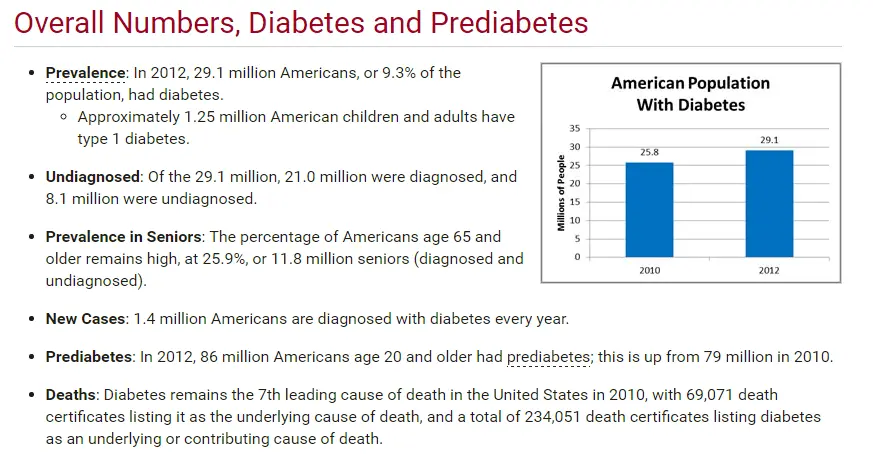
So there is about a 50% chance that this is happening inside your body as you are reading this.
Why is this a big deal?
Because high insulin sends the signal of growth to your body.
Insulin makes your fat cells bigger (2) (meaning you gain weight).
Insulin makes cancer cells grow (3).
Insulin increases your risk of heart disease (4), Alzheimer’s (5), and a bunch of other diseases (6) that you don’t want.
Important to this conversation I want to point a couple of things out.
Many of you may not be worried about cardiovascular disease or Alzheimer’s but you are probably worried about your weight.
At the end of the day, I don’t care what drives you to lower your insulin levels, the point is they need to be lowered.
You should also realize that while insulin levels are high it will basically be impossible for you to lose weight – even if you are dieting (7).
What’s worse is that some crash diets can actually stimulate insulin resistance when the body falsely believes you are in a period of “starvation”.
That’s why it’s so important to lower insulin levels in a healthy and safe way.
Treating Insulin Resistance
One of the main problems with insulin resistance is that our current paradigm in conventional medicine appears to be completely backward.
Even the diabetic association recommends eating carbohydrates multiple times per day with the use of insulin to help lower blood glucose levels.
Unfortunately, it has been shown through several studies (8) that simply lowering glucose levels actually has no benefit in reducing mortality and can actually INCREASE adverse events due to hypoglycemia.
This means we are basically just shuttling around glucose levels in the body and manipulating numbers to make us feel good.
That means in order to treat insulin resistance you will most likely have to go against the “conventional advice” of many doctors and nutritionists if you want to reverse your condition.
And despite what they may tell you, diabetes doesn’t have to be chronic or progressive.
I’ve successfully reversed insulin resistance in my practice (you can see the case study here) and I’m not the only one.
Unfortunately, the way to reverse your diabetes starts with ignoring all the rules:
So now that you know it IS possible, let’s take a look at how you can actually do it.
Diet and Insulin Resistance
One of the single most effective things you can do to reverse insulin resistance is to change your diet.
Now there are some good ways to do this and there are some bad ways to do this, so let’s talk about each one.
First, you need to realize that just going low carb may not be enough to lower your insulin levels and cause significant weight loss.
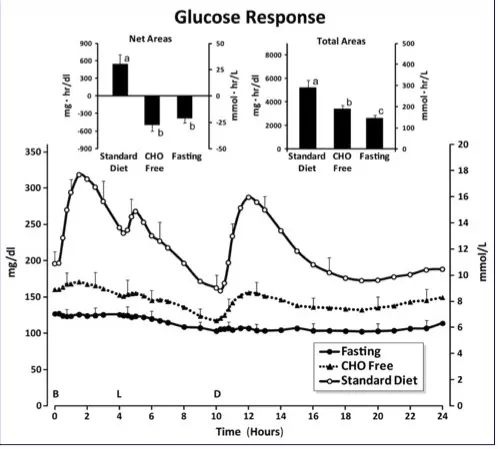
In many patients, a low-carb diet will simply NOT be enough to lower glucose levels.
Why?
I believe this is most likely secondary to other factors including how bad your insulin resistance is and other factors like hormone imbalances.
It is known that high levels of stress and other hormones can increase insulin levels (9).
I’ve found that one of the major drivers that potentiate insulin resistance in some patients is chronic and recurrent stress.
Death of family members, social stress, financial problems, etc.
All of these can potentiate cortisol levels and make insulin resistance worse.
In addition, I’ve found that hypothyroid patients tend to almost always have some degree of insulin resistance.
Most likely this is related to the fact that thyroid hormone plays some role in insulin signaling as you can see here (10).
Because of this, you will need to do more than just simply change your diet.
You will also have to address underlying hormone imbalances, reduce stress levels and make sure you are not eating too much of certain foods.
Let’s take a look at what I mean.
What foods to eat:
In general, I’ve had success in treating patients with insulin resistance when I have them consume raw, whole foods.
I’ve found that you don’t even really have to always avoid fruits and starchy vegetables as long as you incorporate fasting (not eating) into your regimen.
I’ve compiled a list of approved foods you should be enjoying on a daily basis (believe me the list is not restrictive).
- Vegetables: Artichokes, asparagus, bean sprouts, broccoli, Brussel sprouts, cabbage, collard greens, kale, mushrooms, tomatoes, summer squashes
- Fat: Coconut, avocado, olive oil, olives, nuts, and seeds (avoid peanuts) – almonds, cashews, hemp, chia, flax, etc.
- Fruits: Berries (blueberries, cranberries, raspberries), kiwi, lemons, and limes
- Protein: Chicken, turkey, duck, salmon, halibut, shrimp, eggs, sausage, bacon, deli meats, etc.
Instead of focusing on what foods to eat and what is “allowed” instead use this as a guide and ask yourself these questions:
Is this “real” food? (meaning was it created in a plant or did it come from the earth in some way)
Does this food have more than 3 ingredients?
Is this food “natural”?
Does this food make me feel good after I eat it?
Does this food have added sugars in it?
Does the food product say it is “low fat”?
If you answered yes to any of these questions then I would probably recommend against eating the food.
Remember:
When in doubt, leave it out.
What foods to avoid:
Talking about foods to avoid is probably easier than talking about foods you CAN eat.
In general, you want to avoid any and all food products that will be rapidly absorbed in your GI tract and that contain high amounts of sugar.
The hard part about this is that so many foods contain fructose or sugar in some form (it’s just usually hidden under some other name).
Foods to avoid when you have insulin resistance:
- Sugar – Any source of sugar including honey, added sugar like high fructose corn syrup (look on the back of food products), organic cane sugar, brown sugar, etc.
- Refined carbohydrates – This includes bread, pasta, bagels, pizza crust, muffins, tortillas, chips, etc.
- Beer and Alcohol – Consider these products liquid bread for lack of a better word, they will increase insulin levels and cause liver damage
As long as you actively avoid foods that are fake, processed, or have added sugar then you should be good to go here.
And yes, that means you will most likely have to start cooking food!
This will help reduce the number of processed foods you consume on a daily basis.
Portion sizes
Believe it or not, portion sizes are important but not THAT important.
Instead of focusing on how much food to eat, how much your food weighs, or how many ounces you are eating use this as a guideline:
Eat when your body is hungry and stop eating when it is full. Don’t count your calories and don’t overeat just to get certain foods into your diet. Listen to your body.
Now, this advice doesn’t always work – especially if you have leptin resistance along with your insulin resistance, but it’s a great place to start.
If you can’t “trust” your body then use these as general guidelines:
- Protein: 4-6 ounces at a time
- Fruit: 1/2-1 cup at a time
- Nuts: 1-2 handfuls
- Nut butter: 1-2 tablespoons
- Vegetables: 1/2 cup = 1 serving
- Healthy fats: 1 tablespoon
Notice I didn’t include how much you should be eating of each of these per day.
The reason is that each of you will need a unique amount of servings of the various macromolecules based on other medical conditions you may have which we will go over below.
Macromolecule Ratios
This is important because many people get this wrong.
The conventional approach to treating insulin resistance is to just simply go low carb.
But unfortunately, carbs aren’t the only macromolecule that increases insulin levels.
Both carbs and proteins can stimulate insulin production which means your diet should be both low in carbs AND proteins.
That means that most of the food you consume should be from high-quality fats.
A starting ratio should be something like this:
- 50-70% fat
- 20% protein
- 10-20% Carbohydrates
Mix and match these ratios based on how you feel and how active a lifestyle you live.
The more muscle mass you have the more protein you will need, the more activity you do the more carbs you will need, etc.
Just make sure that most of your food comes from high-quality fats without protein.
Other Diets for Insulin Resistance
If the advice above seems daunting or too difficult to follow then you can consider using other diets that have recipes and menus available online.
I’m specifically referring to two diets:
1. Atkins-type diet or Low carb diet
2. Nutritional ketosis or ketogenic diet
The Atkins diet has worked for many people in both helping with weight loss AND reducing insulin levels but you need to make sure you don’t eat a low-carb, high protein moderate-fat version.
That’s one way this diet will fail.
The other diet mentioned above is a VERY high-fat diet (usually 70% plus) with VERY low carbs (usually 10-25 grams per day).
It can also be helpful, but not everyone does well on this diet for various reasons.
Both Atkins and nutritional ketosis have been shown to help with weight loss (11) and reduce insulin levels (12).
So why choose one over the other?
It really depends on your body, how much insulin resistance you are dealing with, and what diet you are most likely to STICK to long term.
Intermittent + Prolonged fasting (Learning when NOT to eat)
Learning when NOT to eat is probably more important than learning what to eat when it comes to reversing insulin resistance.
Almost everyone focuses on carbs and diets because everyone talks about it, but what about fasting and not eating?
It turns out that going without food (intermittent fasting + prolonged fasting) is actually the best thing you can do to lower insulin and blood sugar levels.
Not only is fasting safe, but it’s also effective in helping with weight loss and increase resting energy expenditure (your metabolism).
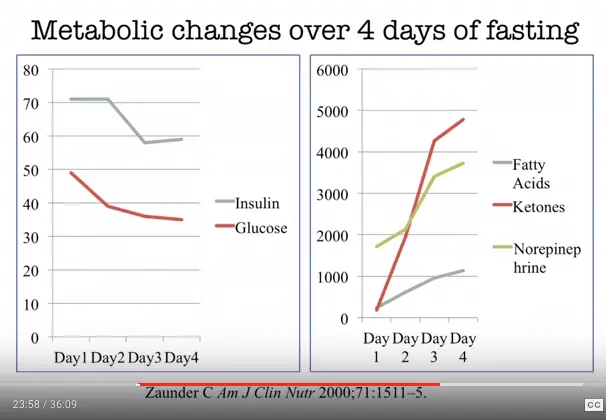
Fasting should be paired with supplements, medications, and diet to help the most with reducing insulin levels.
It’s also important to remember that you shouldn’t begin a fasting routine without some sort of physician supervision, especially if you have insulin resistance or if you are on diabetic medications.
Fasting drops blood sugar and theoretically could cause hypoglycemia in certain patients if they don’t know what to look out for.
Prolonged fasting can also act as prolonged calorie restriction if it is performed too often and ultimately cause metabolic damage and make insulin resistance worse.
It is very powerful if used correctly but likewise can be damaging if done incorrectly.
Treating Insulin Resistance Beyond Diet
As I mentioned previously dietary intervention is certainly important in the treatment of insulin resistance but you can take it several steps further by adding in other therapies.
Specifically, the use of medications, supplements, exercise, and lifestyle interventions can add a multiplicative effect to treating your insulin resistance.
This means that weight loss will be more profound and the lowering of your insulin levels will occur much more quickly when all of these therapies are added together.
The best part about the interventions I’m going to mention below is that they all have literary sources backing them up.
That means they have been shown in studies to help lower insulin levels, augment weight loss, or balance hormones.
I will provide relevant links when appropriate below.
Insulin Resistance Medications:
This is where things can get tricky.
Most diabetic medications are targeted at reducing blood sugar levels instead of focusing on reducing insulin levels themselves.
In fact, many diabetic medications cause an INCREASE in insulin in an effort to reduce blood sugar.
Does it make sense to increase insulin levels further if high insulin levels lead to insulin resistance in the first place?
Not really – but this is how many medications work.
If you remember what we discussed above you will recall that reducing blood sugar levels makes us feel good, but it doesn’t always (or necessarily) reduce adverse events or help patients live longer.
Having said that there are several diabetic medications that actually help lower insulin AND blood sugar levels which results in a reduction in insulin resistance.
Coincidentally it is these medications that almost always result in weight loss as well.
Compare that with the treatment of other diabetic medications like insulin itself, and you will find that it almost always causes weight GAIN (13).
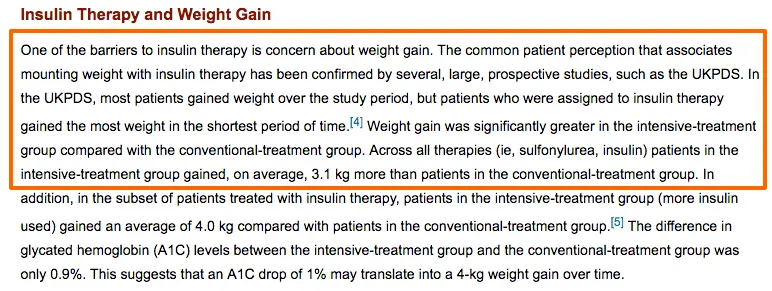
It doesn’t take a genius to figure out that causing weight gain in a diabetic is certainly not a good thing, but this is the reality of the situation.
Instead of focusing on those types of medications, I’m going to list out medications that may actually help:
1. GLP-1 Agonists
These medications act by reducing glucagon in the body.
Gluca-what?
Glucagon basically does the exact opposite thing insulin does. Glucagon INCREASES blood sugar.
We tend to focus only on insulin but glucagon is important because when insulin becomes dysregulated it’s also possible for glucagon to become dysregulated as well.
Glucagon issues lead to chronically elevated levels of glucose even when fasting which can make lowering insulin and thus reversing insulin resistance very difficult with dietary changes alone.
The GLP-1 agonists help stop glucagon from increasing your blood sugar which keeps blood sugar low.
They also can cause a slowing down of the stomach known as delayed gastric emptying.
And in this case, it’s a side effect we are actually looking for. It means the medication is working.
Medications in this class of drugs include: Byetta, Victoza, Bydureon, Saxenda, and Trulicity
Here’s where things get tricky:
I’ve found these medications to be superior in terms of how effective they are at reducing insulin levels, and leptin levels and helping with weight loss when compared to metformin.
They tend to be expensive, but whenever possible I use these as first-line agents in patients with insulin resistance.
This class of medication is helpful in helping patients lose weight (14), reduce leptin (15) levels, and reverse insulin resistance (16).
Of note: these medications have been associated with an increased risk of pancreatic cancer and pancreatitis if used in the long-term setting.
When using them as I suggest the treatment duration is shorter and therefore side effects are less likely.
Some studies (17) have also shown the risk to be very small or non-existent.
2. SGLT-2 Inhibitors
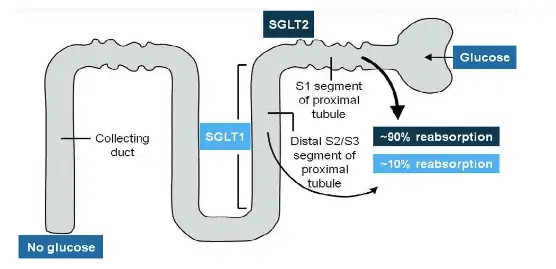
SGLT-2 inhibitors work by blocking the absorption of glucose in the kidneys.
Basically, they change the way your kidneys work and cause you to pee out sugar/glucose in your urine.
This is actually really interesting because most medications focus on simply moving glucose and sugar into and out of cells, they don’t actually get RID of the sugar in your body.
These medications are unique in the sense that they help your body ELIMINATE the sugar which sensitizes your body to insulin.
These medications also help with weight loss (18), but in my experience are not quite as effective as the GLP-1 agonists.
They are potent when combined with other medications and as long as they are coupled with proper dietary recommendations and supplements.
3. Metformin
This medication has been around for a long time and is quite cheap.
For this reason, it’s often used as a first-line medication for pre-diabetes and diabetes.
Metformin has been shown to help with weight loss (19) in both diabetic and non-diabetic populations (those with insulin resistance), but this effect seems to be small if used by itself.
Metformin can be helpful if you are dealing with an isolated cause of insulin resistance and don’t have other hormone imbalances like leptin resistance or hypothyroidism.
If used by itself without dietary interventions this medication will NOT cause significant weight loss.
The fact that this medication is cheap and most doctors won’t think twice about prescribing it may make it easy to acquire if your Doctor isn’t willing to work with you and you have only a slight degree of insulin resistance.
4. Alpha-glucosidase inhibitor (Acarbose)
This is another interesting medication that isn’t prescribed very often.
It acts by preventing the breakdown and absorption of sugar and carbs in the GI tract.
So it helps your body prevent absorbing carbohydrates in case you consume them.
I’m generally not a fan of this mechanism of action because it may promote patients to continue to eat unhealthy which would still cause an increase in insulin if they consume sugars and carbs.
It can still be effective in helping with weight loss (20) in patients who consume higher quantities of carbohydrates, but I wouldn’t jump to this medication as first-line therapy.
Despite this, it can actually help improve GI function in many diabetics by increasing helpful and beneficial bacteria in the GI tract.
If you don’t break down the glucose and carbs for YOUR body your GI bugs can still consume them and thus grow.
As they grow they can help reduce inflammatory levels (21) and improve GI function in some patients.
As a general rule, I don’t recommend the use of medications by themselves, but if combined with all of these treatments they can be very potent.
Insulin Resistance Supplements
While you might be focusing on medication and diet there are some supplements that are very effective at reducing insulin levels and sensitizing your body to insulin.
In fact, some supplements (I’m looking at you Berberine) have been shown to reduce the Hgb A1c as much as the medication metformin (22).
In addition, many of you are probably deficient in some of these nutrients, so replacing them is not treatment, as much as it is replacing what your body is already deficient in.
In some cases, these nutrient deficiencies can predispose you or make it easier for you, to develop insulin resistance.
Supplements that treat insulin resistance:
- Berberine – This supplement helps lower blood sugar, improves cholesterol levels (23), and can help with weight loss.
- Alpha Lipoic acid – ALA can help improve insulin sensitivity, reduce inflammation (24), and can even help treat peripheral neuropathy (25) in diabetic patients.
- Chromium – Chromium helps increase insulin sensitivity (26) and may help reduce the risk of cardiovascular disease.
- Curcumin – In 1 study patients (27) who were pre-diabetic and took curcumin had a significantly lower chance of developing type II diabetes, in addition, it helps reduce inflammation and may help improve pancreatic function.
To get the most benefit you will need to use supplements + medications + diet above.
Using these supplements by themselves will NOT result in significant improvement.
Lifestyle Interventions
We can’t have a conversation about reversing insulin resistance without at least mentioning stress reduction AND exercise.
The lack of exercise can make insulin resistance and high-stress levels can increase cortisol which also makes insulin resistance worse.
While exercising will most likely NOT cause a significant reduction in weight, it can help promote insulin sensitivity and help everything else lead to weight loss.
I’m not trying to tell you that the key to weight loss and reversing your diabetes is “eat less and exercise more”, but there is some truth to the exercise more part.
This is also important because most people do the wrong kind of exercise.
You know, those people who get to the gym and sit on the treadmill for an hour and claim they burned 1,000 calories, and yet they never actually lose weight.
Does this sound familiar?
Aside from the fact that your body doesn’t actually burn that many calories while exercising, that type of exercise also doesn’t lead to significant changes in insulin sensitivity in the body.
Instead of focusing on low-intensity or “cardiovascular exercise” it’s better to exercise LESS but more intensely.
I’m referring to two specific types of exercise:
1. High-intensity interval training or HIIT
2. Slow weight training or weight training of any type
Spending 10-20 minutes 1-3x per week is more effective at reducing insulin levels and helping weight loss (28) than sitting on a treadmill for 60 minutes each day.
In addition to HIIT, I also recommend using some combination of weight training.
The goal here is to build muscle mass to help increase resting energy expenditure, increase insulin sensitivity and help increase your metabolism.
I specifically recommend slow weight training for patients with insulin resistance but in reality, most forms of weight training will help as well.
Blowing steam at the gym or inside your house will also help reduce cortisol levels (29) and reduce stress levels.
It’s a win-win.
Wrapping it up
Insulin resistance is a serious issue but there are ways that you can go about lowering your insulin levels and reversing insulin resistance.
By far one of the most effective ways is to change your diet:
That means eating the right foods, avoiding the wrong foods, and learning when not to eat.
Changing your diet and combining medications, supplements, and lifestyle interventions is by far the best way to reverse insulin resistance.
Using this strategy you can effectively lose weight and start feeling better.
Now it’s your turn:
Are you dealing with insulin resistance?
What has helped you lose weight or reverse your insulin levels?
What advice do you have for others in your situation?
Leave a comment below!
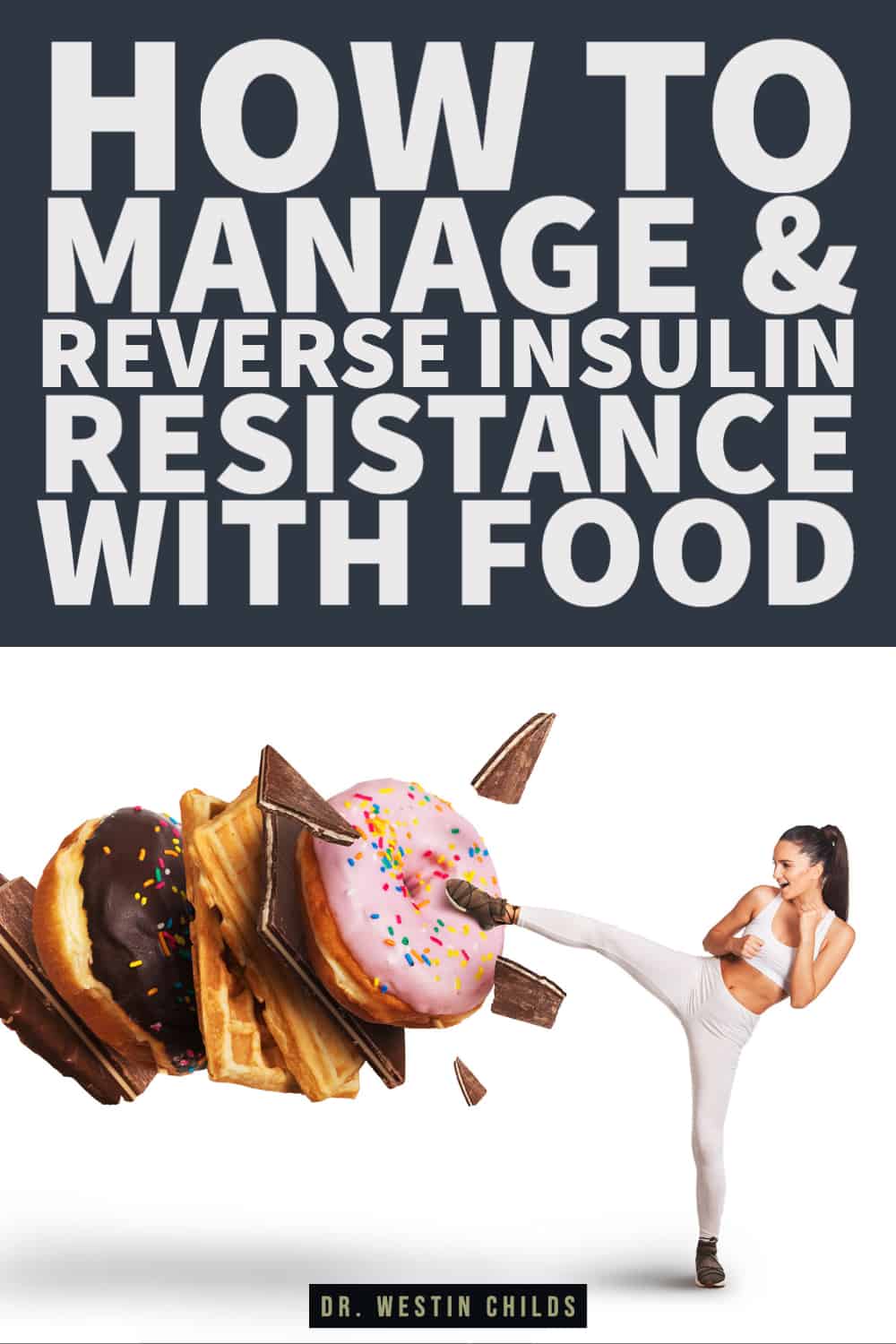
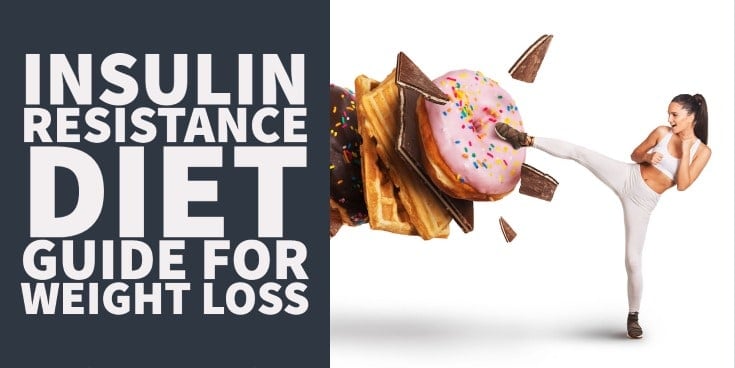

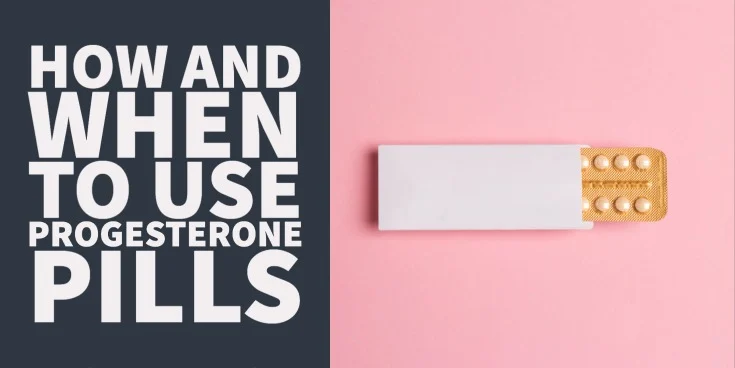





I was diagnosed with Hashimoto’s a few years ago. I am taking Levothyroxine 100mcg and Liothyronine 10mcg daily. My symptoms have not improved. I am fatigued on a daily basis, dry skin, hair loss, brain fog and unable to lose weight. I have been to 4 endocrinologists and an alternative medicine doctor as well as my family physicians. None of them have been able to help me. It’s beyond frustrating! I saw in the comment section that you were able to help people, even though they were not living in your area. I am on the East Coast. Please send me some information, if possible. Thank you!
I am hypothyroid, take 200 mcg of Levothyroxine and am Type II Diabetic, taking 1000 mg twice a day of Metformin (my last A1c three mos ago was 6.5). What diet do you recommend for both of my medical issues. Thanks in advance, April Spoon.
Hey April,
This article is about what to eat and how to eat when you have insulin resistance.
Diagnosed with hypothyroidism, PCOS, insulin resistance, my mother is type 2. My weight keeps creeping up, I’ve been trying to conceive for years, and my Dr told me if I lost weight I would probably get pregnant, and in the same breath told me that my weight wouldn’t budge into all my levels are normal. It’s very frustrating.
Hey Jennifer,
It will be very difficult to conceive until your hormones are balanced but balancing your hormones will lead to weight loss – it’s just a matter of getting the right treatment.
Have you been checked for MTHFR ?
Have you been checked for MTHFR ?
Have you been checked for MTHFR ?
Ty Dr Childs for this wonderful info.
Hi Bettyann,
Glad you found it helpful!
Can Chromium be taken at night?
Yes.
Dr Childs I <3 you, my anty tpo changed after your advices..grettings from Poland
I’m glad to hear it!
Hello!!! Grateful to aver it finding thanks for the good advice because I take levotyroxin 50gr but I’m having concerns with my hormones because they found me cysts in one of my ovarías and also told me that I had a little high my level of sugar that advises me to do to get them off because I want to get pregnantHello!!! Grateful to aver it finding thanks for the good advice because I take levotyroxin 50gr but I’m having concerns with my hormones because they found me cysts in one of my ovarías and also told me that I had a little high my level of sugar that advises me to do to get them off because I want to get pregnant
Dear Dr. Westin Childs,
Thank you very much for sharing you tips and knowledge! I am 30 years old woman with hashimoto and problems with insuline resistance and estrogen dominance. I have very clean diet (without sugar, starch, grains, milk) and last month I have been using Berberine (500 x 3 times/day). I feel very good, but unfortunately I saw a lot surveys and atricles saying that Berberine can make DNA damage? What do you think? Please, let us know.
I have recently discovered I have insulin resistance/elevated insulin. It’s within lab ranges but high end. From what I am finding it should be under 8 to lose weight? Mine was 21(!!!) – all my other levels were in range – ie blood sugar 90, a1c 5.5 – could both be lower of course but not out of the lab range. I believe it all happened earlier this year, along with a bit of hormone crash – all female hormones plummeted at once( I am 47) – assuming the insulin may have shot up then, and I gained 15 lbs while eating same and exercising. I do have Hashimotos but thyroid labs are pretty solid, antibodies actually lowest they have been in years at 160. Curious as to relationship between insulin and other hormones? could my decline of hormones created the rise in insulin?
As of now, my dr has me eating low carb, and taking a few supplements(fish oil, neprinol and a few other blood sugar supporting mixes, magnesium). I have read quite a bit about berberine helping, as well as inositol so I have added those to the daily regime. Does it seem possible to lower my numbers with just these modalities? I do exercise ~ 5days a week a well. I will say my weight gain HAS NOT BUDGED – now I know why, no matter what I have done – but I am wondering if just using supplements, diet and exercise will the numbers go down enough to make some progress? I am so upset with all this -super frustrating.
thanks for any inputs!
Andrea
Hey Andrea,
In my experience the combination of exercise, diet + supplements is usually not enough to help people lose a significant amount of weight and completely reverse insulin resistance. This is just my experience though and may not necessarily reflect the general public as I tend to see more advanced cases. If you’ve been doing these therapies for 6-8 weeks and have not noticed any significant improvement, then they probably aren’t likely to help long term.
Thanks so much for the reply. I have only started a week ago 🙂 – but I am always hopeful! I already exercise so thats not new and my diet is not normally terrible but always room to improve. I did find the case study interesting about the woman with hypothyroid and high insulin and the use of adding t3. Do you find that you normally have to add metformin or other similar acting drugs to get it down or could t3 be an option if a person also has hashimotos/hypo? I will take the other if I absolutely have to but I do hate the thought of adding drugs for this!
If diet, exercise, and supplements are not enough, what is?
What an I not understanding?
Hi Roberta,
There are other therapies I don’t discuss on this blog post but that I go into detail on in my weight loss guide.
Hi, where could we find your weight loss guide?
Hi Adele,
You can find more information about it here: https://www.restartmed.com/hormone-mastery/
Hi – I have type 1, and I don’t believe this really applies to me. I do have inflammation, and I also have hashimoto’s, but I already eat low carbohydrate because I follow Dr. Bernstein’s diet. Could you please clarify that you’re mainly talking about type 2 here? I clicked on this article because I had hoped it would be helpful at getting to the bottom of why I’ve actually gained 15 lbs since I was put on thyroid hormones after having Hashimoto’s most likely my entire life (always had off the charts TPOAb, TgAbs) with no change in my eating. My sinking suspicion is that I have high RT3. Unfortunately, I’m dealing with Kaiser, and they’re ZERO help (won’t even run a free T3 test, let alone a RT3 one). So I’m trying to get a complete clinical picture before I pay out of pocket to see a doctor who really knows what they’re talking about when it comes to thyroid.
Hey Melissa,
Type I diabetics get insulin resistance from taking insulin just like type II diabetics. Many of the same principles still apply, it doesn’t matter if the insulin is produced endogenously or given exogenously – insulin is insulin and too much will cause resistance.
HI Doc!
I loved this article so much! My 12 year old daughter has been struggling with IR for two years. We’ve been to a pediatric endocrinologist. While I known their intentions are good, they put her on a diet of 130 carbs a day. What a struggle this has been. She continues to gain weight. She has the darkening of the skin in so many areas. Her eating isn’t awful but she’s always hungry and it’s so hard to be 12 and have to diet. She plays volleyball and works out 3 times a week with me. I would love your advice!
Hello!
I am about to get my fasting insulin tested but I’m pretty sure it is going to be elevated. I have gained so much weigh and a crappy diet(due to lack of energy and fatigue)after my thyroidectomy. You mentioned “fasting” in this article but didn’t really define that. How many hours in between meals should one be aiming for? I spent a year with a nutritionist who had me eating every 2.5-3 hours in efforts to keep blood sugar stable to avoid high sugar cravings(no diabetes; very strong family history though).
I just had bloodwork done and my insulin is 21 for fasting … 8 am. Is when blood was drawn.
Leptin 117.
I have had hashimotos since my 20’s and I’m 63 now! I’m soooo frustrated have done ketogenic diet for 4 was now and haven’t dropped a pound.
My rt3 is 21 & freet3 is 4.2
Thyroid peroxidase 140
So I asked dr for ldn. Low dose naltrexone … am skiing for byetta or similar med,
I got zinc, selimium, probio and adrenal supplement you recommended. I also got lacetyl carnitine because I was deficient
Am I on right track ? I want to join one of your programs but am not sure which one.
Thanks
Renee
Hi Renee,
I discuss how to manage certain medications for leptin and insulin resistance in my weight loss guide.
Is Myo-Insotol a supplement you would suggest?
Hi Leanne,
You can learn more about myoinositol here: https://www.restartmed.com/myoinositol/
Just had my (almost)fasting insulin level tested. 6.1 What is optimal range?
I enjoy and value all of your information. I have had hypothyroidism for 15 years. I have always been very active, I ran the Chicago marathon 2015 but now I am wanting to concentrate more on muscle building and HIIT cardio. I can not find any information on building muscle with hypothyroidism. I want to know what protein shakes are recommended and if I can take pre-work out, etc. Any suggestions?
Thanks in advance,
Lisa Schmidt
I´m recently diagnosed with insulin resistance, this article is very helpful. Thank you You say that intermittent fasting is helpful, meaning 16/8 then ? Do you have an example of meal plan ? This is so much more fat than I have ever consumed, I´m not sure what to eat, I have lactose intolerance so I can´t have that. I do take Metformin 4*500 mg pr day.
Hello,
I was diagnosed with insulin resistance and PCOS. I had done a Glucose Tolerance test and insulin tolerance test. My first one, showed 400 in insulin for the first hour but my glucose was in normal range. I was put on Metformin 2,000 mg daily for 6 months before doing a second test. I was not on a good diet while on the Metformin. In the second test, my insulin was the same but my glucose levels were now elevated as well. I have stopped taking the medications since I found no difference and found that it made my glucose worse. Should I go about trying different meds that target the body differently? Or should I try the Metformin again with a better diet? I have been taking a supplement NAC while off the Metformin and have been weight lifting about 3-4 times a week.
Thanks for this very helpful article. My question is- should I just be patient and keep doing what I’m doing……
I have insulin resistance and newly diagnosed type 2 diabetes with around 25 kilos to lose. I have literally tried everything to lose weight and nothing works. I developed reactive hyperglycemia which makes it difficult not to eat every three hours. My husband and I are doing keto and enjoy it. He’s lost six kilos in a month, me nothing! I haven’t cheated and counted my macros. I’ve worked really hard. I have done the HCG diet before with injections and lost a lot of weight quickly which was the k my way I have ever lost weight, only to put it on again and more and since then not been able to lose an ounce no matter what I do. I have tried every diet and every exercise plan. I went and saw an endocrinologist who put me on Victoza and metformin but I kept having low blood sugar episodes on the lowest dose and I ended up putting on more weight because I kept eating to stop these episodes. I am completely and utterly frustrated as I eat healthily and try so hard. I should mention I have severe endometriosis and have had to take a lot of medication over the years including painkillers, did Ivf to fall pregnant and have only had a weight problem since I’ve had kids. When I went to see the doctor about my frustration, she said to get my stomach stalked, eat less and exercise more. I feel no one is listening and I have no solutions!
How can I have good fasting glucose (86) and normal HgbA1C (5.1) levels yet have a fasting insulin level of 10? If insulin resistance is anything above 5, how come that’s not reflected in the other lab values?
Hello Dr. Childs! All this is new to me. I was recently diagnosed with Hashimoto’s. And the doctors did not explain all these facts surrounding hypothyroid and insulin resistance. YOUR ARTICLE HELP TREMENDOUSLY! !!
Thank you! Now to try an implement what I have learned.
Totally insulin resistant, have been on insulin 18 years andalthough quite knowledgeable re nutrition gained much weight and couldn’t take off. Just started on Berberine, low carbs, added good fat back into diet, 4 ounces proteins, and low calories and intermittent fasting. Lowered insulin to 1/4 the dosage. Question: Do I also take ALA, CLA,chromium, etc at the same time as the Berberine or u.s. that over-kill. Please, please, answer. Thanks. I’m 78 and not much time to turn this around.
Hi Sandra,
It’s probably overkill taking that many supplements but 2-3 should be okay to use.
Thank you Dr the great article.
I’m at a horrible place. I have RA, hashimotos and have been on prednisone of and on for 5 months. Gained about 20 pounds. I am insulin resistant. Tried Ideal Protein diet and for the first time in 25 yrs I lost weight. Had to stop due to the cost. I tried to do on my own. Didn’t work.
I must be missing something.
Hi Dana,
If the ideal protein diet is a caloric restrictive diet then that may explain your inability to lose weight now (due to a damaged metabolism).
Hi Dr. Childs–my fasting insulin was 8.. is this too high?
What’s optimal for weight loss?
Thank you!
Hi Diana,
I find patients lose the lost weight when their fasting insulin is less than 5.0.
You suggested we asked several questions about potential foods before consuming…
Some of these questions “yes” seems like something we should be eating but you’ve said below those questions if you answered yes to any of the above… do not consume.
Two that I am questioning are:
Is this real food?
Is this a natural food?
I’m way mixed up on my health and I’m looking for guidance… apparently, I’ve been doing everything wrong and have slowly gotten obese doing low fat & low calorie with moderate exercise.
I take levothyroxine 225mcg.
Hi Ruth,
Many people are certainly confused about what they should and shouldn’t be eating. I would recommend that you check out this post which outlines how to proceed with your diet if you have thyroid disease: https://www.restartmed.com/hypothyroidism-diet/
I wanted to know if fasting and low carb diet could help bring down my insulin level to a normal level or if I would need medication as well. I also exercise at least 3 x wk. My fasting insulin level is 54, fasting BS level 105. I also have hypothyroidism and currently am on Synthroid 88 mcg. My ESR and CRP are always elevated. +ANA 1:640 along with my IGM being elevated. I am also wondering if all of my inflammation, joint pains, fatigue could all stem from being insulin resistant? Rheumatologist does not know what to make of my results. So went to an endocrinologist who did insulin level and he discussed possibly starting on metformin but after reading your article am not sure that is the route to take. I would appreciate any insight.
Hi Becky,
If insulin resistance is caught early then you can usually reverse it with diet and supplements alone.
What is your though on adding Vitamin D or Inositol to my daily routine?
Hi Amy,
You can read more about my thoughts on Vitamin D here: https://www.restartmed.com/vitamin-d-thyroid/
I am 50 years old, and I have Prediabetes, I want to try (intermittent fasting + prolonged fasting), At my age, and with the condition that I have, is it safe for me to do 16/6 fast? Thanks!!
Hi Johnna,
It’s safe for most people, but if there is any question you can touch base with your current doctor to make sure.
Dear Dr. Childs
I have high blood sugar, am insulin resistant and suffer from hypoglycemia (bs is always in a higher range but drops from very high to high after meals). So, is it a good idea to take berberine with hypoglycemia? Or does that worsen the situation?
Thanks for your answer!
Hi Nicole,
It’s probably not ideal to use berberine as it may worsen your blood sugar.
Hi Dr. Childs, My daughter started gaining weight rapidly when she was 4 years old. We ate a healthy diet prior to this (organic…junk was rare). She is now 20 years old, 5’5″ and 268 lbs! She was diagnosed with insulin resistance and rarely has grains. She works out 5x/wk, eats low carbs, drinks water, takes metformin & supplements. Her lab values are amazing (only insulin is elevated @ 23, A1C= 5.4) but she’s still gaining weight!! We’ve been to endocrinologists but they only prescribe Metformin. What do you recommend? Could we be missing another issue? THANK YOU!!
Hi Stephanie,
You should look at other hormones including thyroid hormone and fasting leptin as well.
Hi Dr. Childs, I am facing the same issue with my daughter. she is on 750mg of metformin twice a day and also taking Vit D supplements. Her thyroid levels are normal. We have noticed an increase in her facial hair and have had some more tests were done which came back – she has low iron, her DHEAS is slightly high. Is there something we are missing? Please advise.
Hi Dr Childs, I am facing a the same problem as Stephanie with her daughter. My daughter is 17, 5’7” and 260 lbs! she is currently on 750mg of Metformin 2 times a day and Vit D supplements too. Her testosterone levels are also slightly high and her thyroid is normal. Should we be checking for anything else?
Hi May,
Yes, you should also look at her thyroid function. You can learn more here: https://www.restartmed.com/normal-thyroid-levels/
Dr Childs, We have already checked her thyroid function and it is normal. What more can we do to help her?
Lab test-wise, what do you consider to be insulin resistant? What value are we looking for?
My insulin test has a “normal” range of 2.6-24.9 uIU/mL.
I’ve heard it should be no higher than 3.
What do you consider the danger zone?
Hi Adel,
Early or mild insulin resistance is much more difficult to diagnose than moderate to extreme insulin resistance. I look at fasting blood sugar, fasting insulin, and hgb A1c together to make that judgment.
I’ve been tracking my blood glucose. I don’t eat after dinner, but I wake up a bit high 105 – 127. I track 30, 60, and 120 minutes after breakfast, and it goes up into the teens or 120’s but then comes back down to the 90s or just above 100.
Last insulin test was 5.7. Haven’t checked A1c in years, but going for that test this week. This 5.7 was my highest insulin test ever. It worries me.
Pretty sure I’m insulin resistant and my sugar content per day is <30g. I eat flourless bread, eggs, turkey bacon, cheese, organic cereal, no sugar almond milk, organic granola. Cannot lose a pound and have no energy! These diet books and recipes are written for those who have all day to cook and bottomless pocketbooks. I swear they all compete to see who comes up with most extravagant recipe! Where can we go to get recipes for those who are picky eaters and don’t have all day to cook? Something simple?
Hello. Since you advise more fat in the diet what do you tell patients who don’t have a gallbladder?
Hashimotos and no gall bladder..
Bile supplements don’t seem to work for me. I still don’t digest fats for years with or without them. This causes digestive issues as well.
Hi Dr. Child’s,
I have been able to lose weight on Victoza, metformin and LDN over several months and would like to discontinue these medications and focus on lifestyle/diet and your recommended supplements. I am not diabetic, though lab values are just outside your listed ideal ranges. So would like to maintain this weight without pharmaceutical intervention.
Do you have any general advice on how to maintain weight loss long term after going off the meds that helped in the first place? (Eg. supplement dosing or transitioning between therapies, specifically for leptin/insulin)
My diet was very clean before the medications, but I couldn’t lose weight. So I worry that stopping, even with good eating/exercising habits, will lead to becoming overweight again.
Thank you so much
Dr Childs, Would you recommend a CGM, to try and identify foods that could be spiking your sugar levels, and should be avoided?
Hi Philip,
I suppose that’s an option though I don’t really think it’s necessary for most people. It depends on your situation, what type of medical condition you have, and how important insulin/blood sugar is to your health.
I have been Hypothyroid all my life since birth, and now I am 64 and , post menopasual, and most likely insulin resisitant maybe even Leptin resistant my doctor has not tested for it. But I have gained over 50 lbs of weight over the past 4 years. and I am so frustrated in being Fat .
I also take 100mcg of Synthroid. The biggest problem with many of your suggestions for weight loss meds My doctor wanted me to try Saxenda, but technically it is that are for Diabeties . And many Health Insurance companies will not cover them as for just Weight loss. or any or any perscription medications And out of pocket costs are not affordable. for example Saxenda would be $1400 per carton per month. but can not afford it. . My Insurance plan does not cover any of them . but if I was diabetic then yes they will cover them of course. and the insurance would coverage would bring it down to $60 a carton. but I am not Diabetic , But my Doctor will not lie to the insurance company its very frustrating and I am getting tired of spending money that I dont’ have on cheap supplements that do not work either.
Hi P. Stark,
You are correct that these medications are often used off label but they are still very effective. And the way I look at it, you can’t afford NOT to use them. Being overweight is guaranteed to cost you tens of thousands of dollars throughout your life due to high blood pressure, high cholesterol, reduction in quality of life, low hormone levels, low energy, increased risk of developing cancer, decreased productivity at work, and so on. There’s no question that you will pay more for being overweight than you will in the short term for medications and other therapies to help with weight loss. It just feels like more because it’s all at once versus paying way more over a longer period of time.
Hello – I want to query something re GLP1 injectors, like Trulicity.
I was recommended to try them a short while ago by my diabetic nurse but when I did a very basic search about possible side effects, some information came up straight away from healthline.com saying that they can cause or have a risk of thyroid cancer – ? I’ve copied that information at the end of this comment box for you to read – other similar articles had also popped up.
My situation is that I’ve had T2D for nearly 10 years (I’m 57). I have recently had thyroid cancer and had my thyroid removed 6 months ago, with RAI 4 months ago. I do feel good, am about 10 pounds over weight but my blood sugars are increasing with the use of thyroxine, despite good diet and exercise and IF etc. Despite the blood sugars, my weight is not increasing.
I’ve been told that the trials for Trulicity were conducted on mice and that as their internal structures etc do not reflect those of humans that I should not be concerned – ? Please advise.
I’ve copied the information below, but the formatting has not copied over:
“What are the serious side effects of Trulicity?
In rare cases, Trulicity may cause serious side effects. Serious side
effects that have been reported with Trulicity include:
thyroid cancer*†
hypoglycemia (low blood sugar)
kidney problems
pancreatitis (swelling of the pancreas)†
allergic reaction* ‡
severe digestive problems, such as gastroparesis (the stomach
digesting food too slowly)
If you develop serious side effects while taking Trulicity, call your
doctor right away. If the side effects seem life threatening, or if you
think you’re having a medical emergency, immediately call 911 or
your local emergency number.
* To learn more about this side effect, see the “Side effects
explained” section below.
† Trulicity has a boxed warningTrusted Source for this side effect.
This is the most serious warning from the Food and Drug
Administration (FDA). To learn more, see the “Side effects
explained” section below.
‡ An allergic reaction is possible after using Trulicity. However, an
allergic reaction wasn’t seen during studies of the drug. There have
been reports of this side effect in people using Trulicity, but it’s
unclear how often this has happened or if Trulicity was the cause.
Hi Samantha,
The last time I researched the topic it did look like there was a small but real increased risk of cancer from using those medications. Having said that, we also know there is a real risk of cancer from being overweight and from insulin resistance so the question really becomes which risk are you willing to accept.
hello doctor childs i have a rare disease i started masturbation and my pancreas is producing too much insulin and now i got hyperinsulinemia what hormones or organs causing this i think dht or dhea or pregnenolone also cause this? which supplement you recommend DR ?
Hi doc, I was recently diagnosed with insulin resistance and have always had hashimotos. I was put on a diet similar to the one you suggest. What I found most helpful was the order in which to eat things too- they(endo n nutritionist) explained I should always start with a salad or some kind of veggies with about a tbsp of olive oil. The point is to get the fat into the stomach first. Then some kind of protein and carbs (I was told to control the portion size of carbs the most but to eat more or less depending on how I feel that day). They said fruit has a lot of vitamins so I shouldn’t rule it out but to have it at the end of the meal as a dessert. I found myself light headed when I exercised so I was allowed to snack before (some kind of fruit and a handful of nuts). Being diligent with this I lost about 1-1.5kg a month and have kept it off. I also try to eat 2-3 times at the most in an 8h window, although if I can do it in 6 that’s ideal. I honestly haven’t felt better and we haven’t started on medication or anything just yet (I’m trying to put that off as long as I can). My endo clearly thinks similarly to you- but for your readers I thought this easy tip on the order of food may be useful.
Thanks for your work
Hi NH,
Glad to hear you found what worked for you! Thanks for sharing.